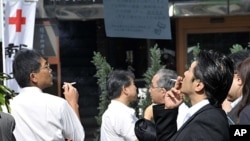The policy head of Japan’s ruling party has called on the government to sell its entire stake in Japan Tobacco to help fund the reconstruction of the region hit by the March 11th earthquake and tsunami.
The possible sale of the government’s 50 percent stake in Japan Tobacco - the world’s third-largest cigarette maker - is part of a series of measures to raise emergency funds for the disaster-hit region.
Television reports said the Democratic Party of Japan also agreed to draft another supplementary budget for the current fiscal year, worth about $157 billion, most of which will go towards post-disaster reconstruction.
The government hopes to raise as much as $120 billion through new tax increases. The tax increases are $26 billion lower than originally expected, which the government hopes will win opposition support for the plan.
After two days of intense negotiations, senior DPJ officials agreed to temporarily increase income, corporate, residential and tobacco taxes in the next three to ten years. The money will be used to pay back new debt issued to generate revenue for the disaster reconstruction program.
The government is expected to spend $248 billion in the next five years to pay for reconstruction.
Japan’s public debt - now twice the size of its five trillion dollar economy - has forced the government to seek alternative sources of revenue. The two-stage sale of its stake in Japan Tobacco and other entities is expected to raise about $90 billion. Some of that total will come from spending cuts.
This week, Seiji Maehara, the Democratic Party of Japan’s policy chief, surprised many people when he called for the government to offload all of its Japan Tobacco shares.
Maehara tells reporters the government is keen to put the funding measures in place as soon as possible. He says he hopes opposition parties will quickly accept the government’s sincere request to cooperate so that rebuilding can begin.
Shares in Japan Tobacco Incorporated rose by as much as nine percent on Thursday's news.
Despite the positive response from the market, the government still faces legal hurdles for the deal. The sell-off would require a change in the law, as the government already owns the minimum legal stake in Japan Tobacco. Tobacco farmers, who are traditionally close to the opposition Liberal Democratic Party, may oppose the move because of concerns that a fully privatized Japan Tobacco will no longer buy their entire crop.
The cabinet is expected to submit a draft of the emergency budget and tax reform bills to parliament in October.
Japan Proposes Selling Tobacco Stake to Fund Quake Recovery




